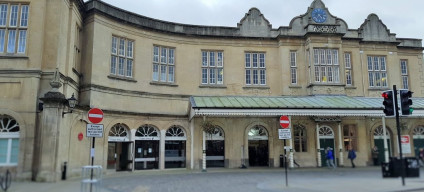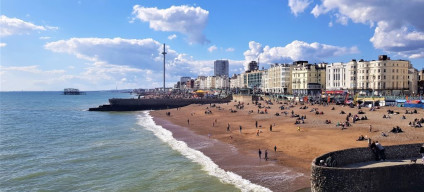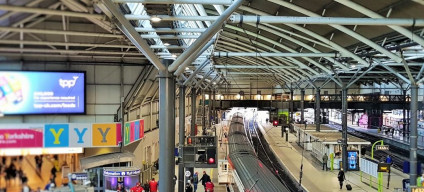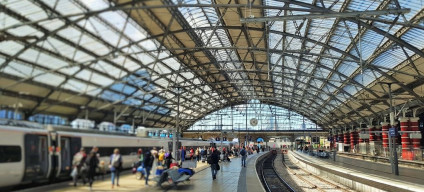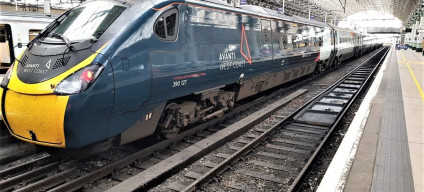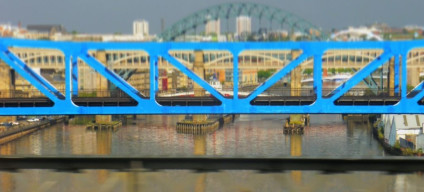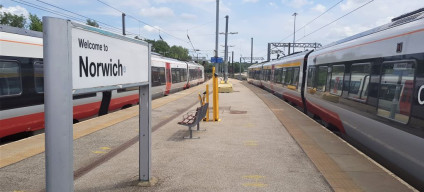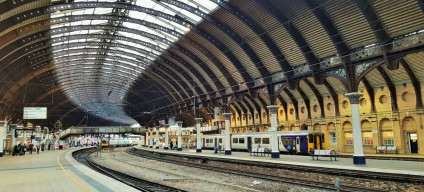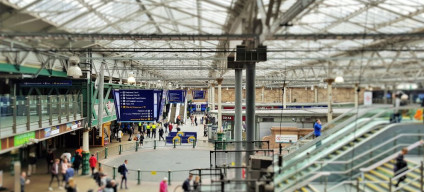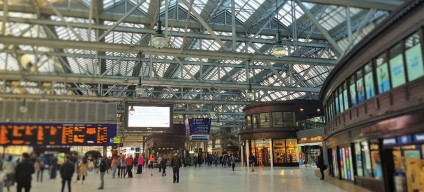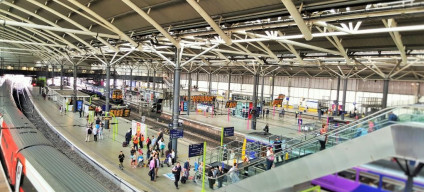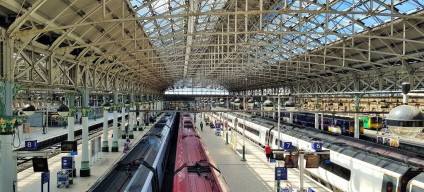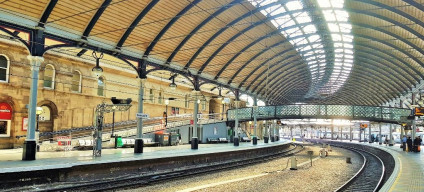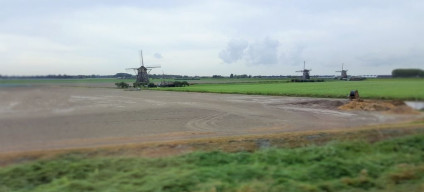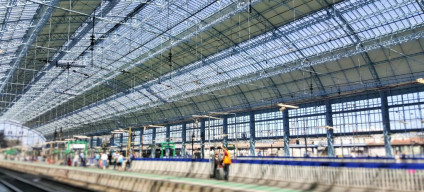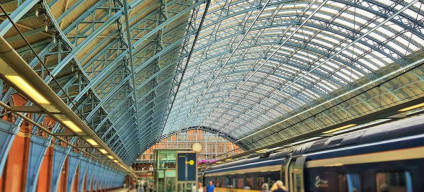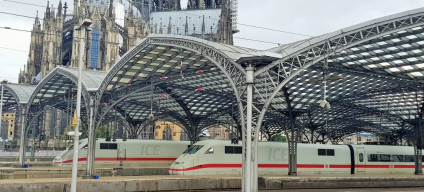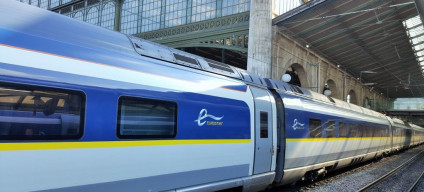Related Content
Content
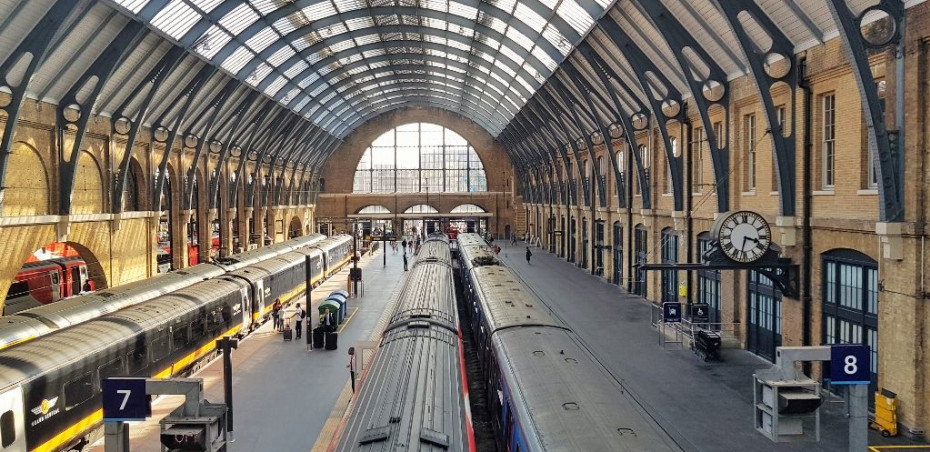
Great Britain by train
Welcome to our guide to traveling in Great Britain by train; it should save you time money and confusion!
Share
How to travel by train in Great Britain:
There are many unique aspects to travelling by train in Great Britain, but more often than not, what are now typical aspects of taking a European train journey apply.
If you want to save money on a one-way, long distance journey on a direct train, then the start-to-finish steps of looking up a journey and booking it online aren't particularly unusual.
So if you book ahead you can often obtain a cheaper price, but then have to stick by the terms of the type of ticket you have chosen.
What can make planning train journeys in England, Scotland and Wales a tad bewildering are the multiple methods of saving money, which you may, or may not come across; particularly when making a return journey.
You may be offered a choice of different ticket types, prices or train services, depending on the journey you will be taking.
Something exceptional that does need explaining is the use of Great Britain as the country name in place of United Kingdom, as well as the references to British trains and tickets across SMTJ.
It's because train services in Northern Ireland are both managed separately and linked to the rail network of The Republic of Ireland - so they will be included when we add The Republic Of Ireland to ShowMeTheJourney.
Helpful links:
Why the train operators matter:
Every European country takes a unique approach to how it operates its train services, but the core difference with Great Britain’s (England, Scotland and Wales) rail network is the lack of a dominant national rail operator.
Instead a multitude of private operators provide the train services, with each separate Train Operating Company (TOC) being responsible for its own network.
And two or more companies can provide the train service between cities and this can impact on how tickets can be used on such routes.
Which company (TOC) is providing the train service on a route impacts on both the ticketing and the on-board experience.
That's because each specific TOC manages how its tickets will be sold, such as the types of ticket which will be available to purchase on each specific departure.
They also have the freedom to set the service levels provided to passengers on the trains, including which catering facilities will and won't be available and how the Wi-fi access will be managed.
The 19 Things Most Worth Knowing...
These are the 19 things that are particularly useful to know about rail travel in Great Britain:
1. The contracts which are awarded to the companies, which operate the trains have a regional element, so typically only one company provides all of the trains over large comparatively areas. Therefore all many travellers will need need to aware of is how that one company manages its trains - This is the case when exploring the likes of Cornwall or Kent, or Scotland, or Wales.
2. Despite the multiple companies which operate the trains many aspects of UK rail travel are universal, because the network is managed by National Rail - so it's a good source of info such as schedule adjustments due to construction works and looking up station facilities, journey planning and regional rail passes.
3. Also many aspects of rail travel in Britain apply, regardless of which company is operating the trains on each route - these include:
- tickets / charges not being required when taking bicycles - though some companies have a bike space reservation policy;
- tickets not being required for dogs; though there is always a maximum limit of two dogs per adult ticket holder;
- when they are available on a route, seat reservations are optional - though they will be automatically included when booking online;
- no charges for opting to add a reservation;
- children aged 4 and under travel for free and those aged 5 to 15 travel at a discounted rate of at least 50%;
- the acceptance of rail passes and railcards.
4. Aspects of travelling by train, on which the companies set out their own policies include:
- whether seat reservations will be available at all;
- if First Class will be available;
- ticket promotions, particularly around child tickets and making a return day trip - when available, Off Peak Day Return tickets, typically cost less than £2 more than a one-way ticket;
- the types of ticket offers which will or won't be available - which can matter to the prices that will be charged when multiple companies provide trains between two locations.
5. Though travellers can choose between companies on comparatively few routes.
6. Most of the companies except Scotrail, also make a distinction between Peak travel times and Off-Peak travel times, with Peak times being applied on Mondays to Fridays before and after business hours - So making journeys at the Off-Peak times is cheaper, hence the availability of Off-Peak tickets.
7. The tickets which can be used at Peak times are the Anytime tickets, but for long-distance journeys they can be exceptionally expensive.
8. Most companies also offer limited numbers of discounted Advance tickets on longer-distance routes, regardless of the time of travel - which can be less than 25% of the cost of Anytime tickets.
9. Some of the train operating companies offer Advance tickets when booking tickets on the travel date, they can be taken off sale only 5-60 minutes prior to departure - Avoiding the Anytime tickets when booking tickets shortly before departure can save more than £100!
10 The idea is that Advance tickets can only be used on the the specific departure selected when booking, so if a seat reservation is available on the train, it is automatically included when booking this type of ticket.
11. When having booked Anytime and Off-Peak tickets for a long-distance journey, the idea is that you can choose between departures on a travel date - though those with Off Peak tickets can't travel at Peak times.
Seat reservations are included when booking ahead, but they can be transferred to alternative departures - note that on services on which they are typically available, seat reservations won't be included when booking last-minute Anytime and Off-Peak tickets at a station.
12. Off-Peak and Anytime aren't discounted, but despite this National Rail stipulates that they are placed on sale 12 weeks ahead, but the operator's decide when to make the cheaper Advance tickets available - it can be before or after the Anytime and Off-Peak tickets have been released for sale.
13. Advance tickets aren't typically made available when construction works are being carried out on a route, because they are not valid on replacement bus services.
14. Tickets are also not typically available at the lower Advance rate for end-to-end journeys which involve connections between trains, but booking and using 'Split Tickets' can be a money saver - see the info in the 'Notes on the Ticketing' below.
15. These ticketing inconsistencies have encouraged a swathe of third party online services to sell rail tickets in Britain, hence the multiple 'National' companies on the ticket guide, but National Rail also sells tickets for any rail journey in Britain - plus each of the operating companies have booking services which also sell all or most national rail journeys.
16. An atypically large number of railcards are available, which typically provide a discount of one third off the price - and most of these, including Family and Two-Together Railcards, can be used when visiting Britain.
17. If you have a seat reservation you can occupy other seats instead - Most long-distance trains now have a system of Green light = seat available for the entire journey; Orange light = seat available for part of the journey; Red light = seat not available, so you can see whether you want to move to a seat by a window, at a table, or in a less busy part of the train.
18. Long-distance trains are comparatively frequent, when travelling between London and other English cities, and between London and Edinburgh, a minimum of two x trains per hour are typically provided.
19. When travelling First Class with most of the companies which operate the longer routes from and to London - Avanti West Coast, GWR and LNER, a complimentary hot meal service will be offered.
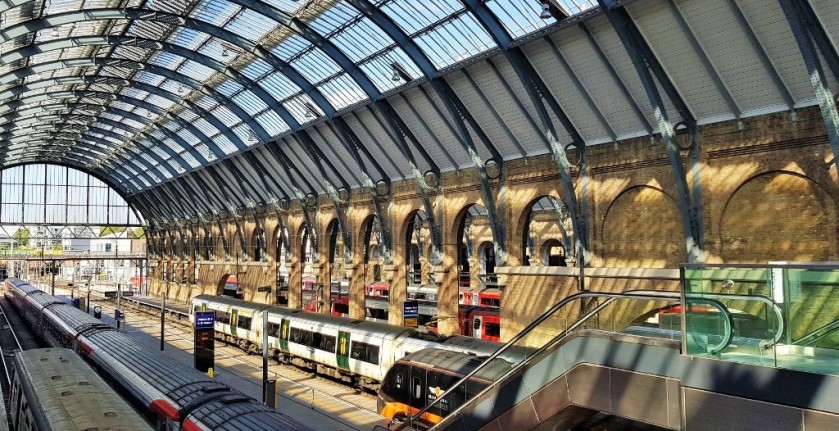
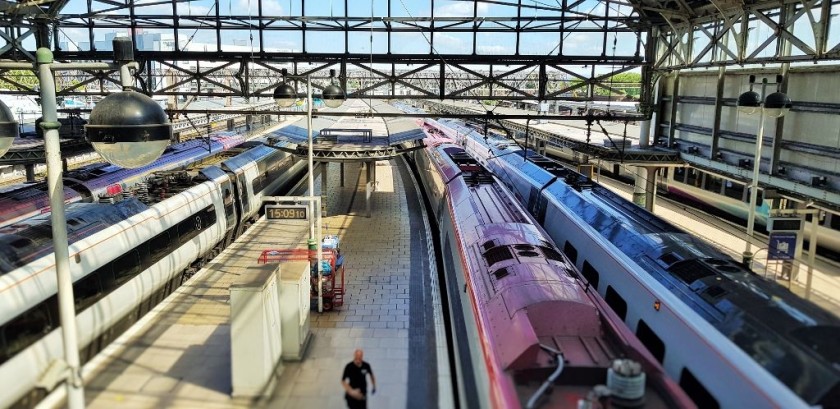
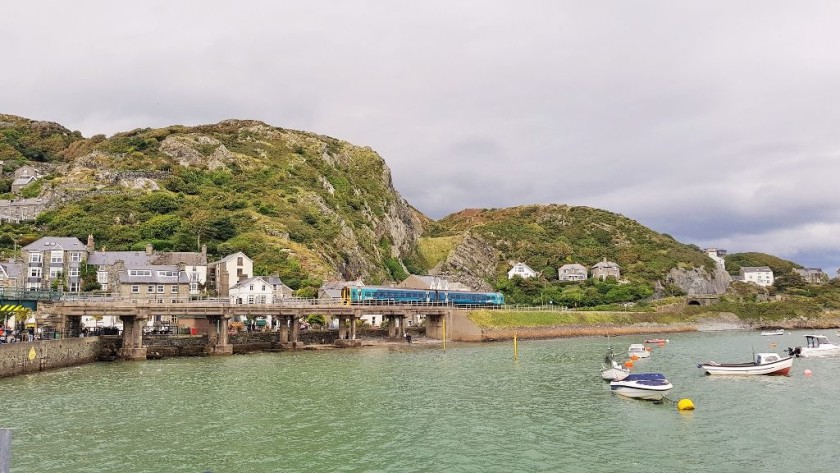
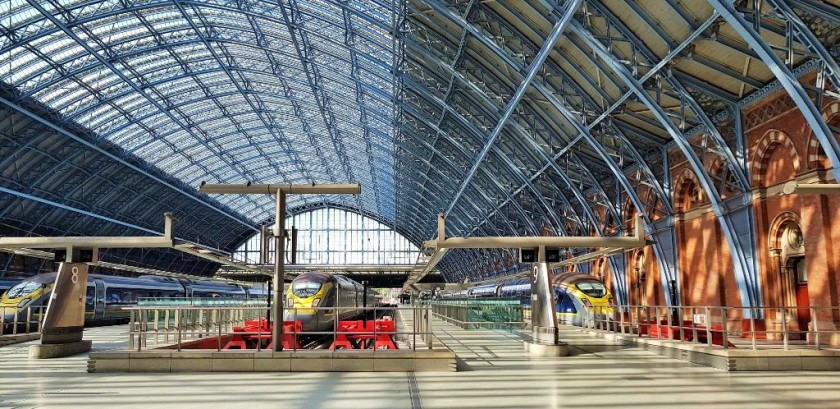

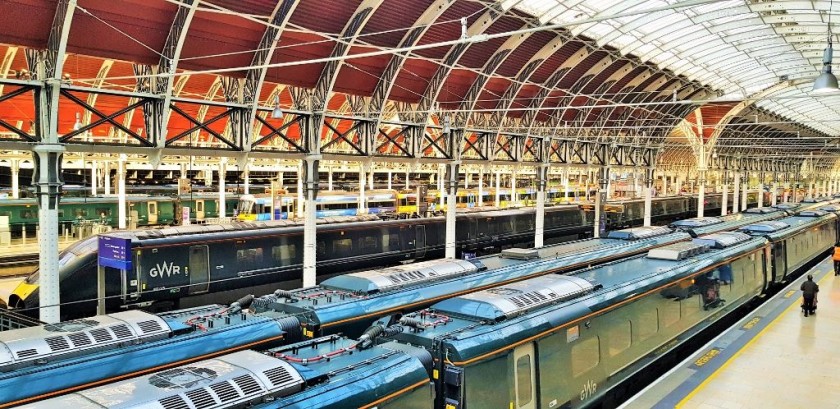
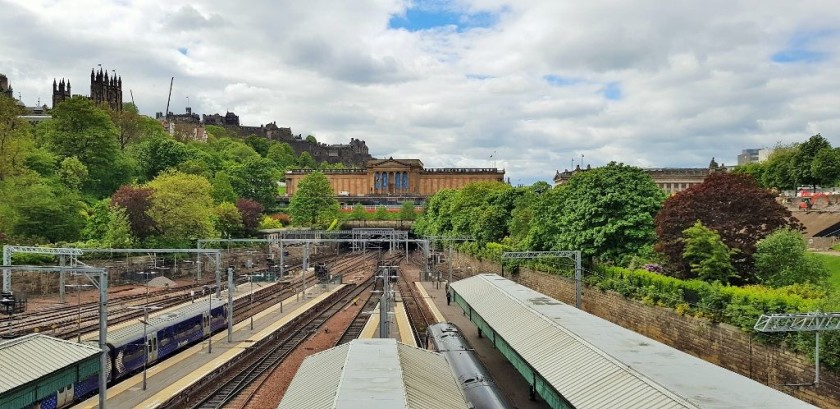
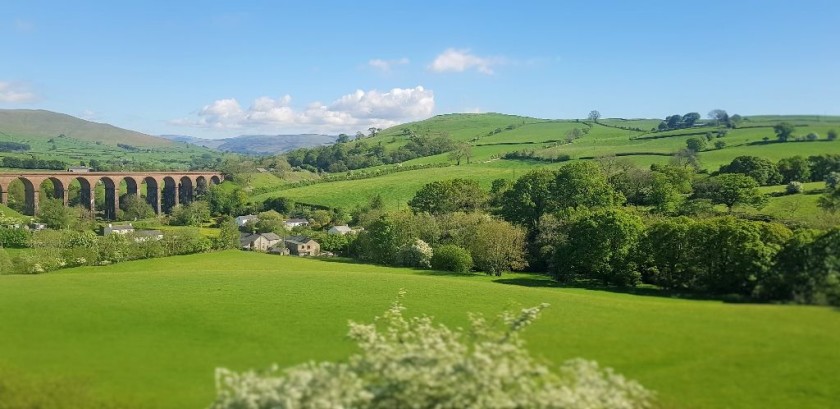
When travelling by train:
The rail network is centrally managed by National Rail and its website is a great resource for planning journeys, looking up general ticket and national rail pass info and checking whether maintenance works will be impacting on the route you will be travelling by.
It’s also a central resource for information and booking of mobility services for those that require additional assistance.
Information on board:
In the coaches of most trains used in Britain there will be electronic information showing the calling points of the train.
It is worth checking to see if the station you're heading to is the next calling point; as the automated announcements which will say "this train is now arriving at..." usually occur only around a minute before the train will get to a station.
This destination info is usually all that's available on the info screens on British trains, info such as details of onward connections, the location and the speed of the train, isn't typically shown.
So if you will be making an onward connection it can be worth asking the conductor, for the time and platform number of any subsequent train you will be taking.
The seat reservation info
Because seat reservations are optional on British trains, systems have to be used to inform passengers without reservations which seats are available.
Therefore information for reservations is assigned to each specific seat.
On newer trains this is shown electronically, with the info being above the train windows, green lights can indicate available seats, but on older trains paper cards are inserted into the back of the seats
So if you have a reservation, the usual procedure is:
1: find your seat number(s), which will be on your reservation or ticket - or if you have booked a mobile ticket, you may need to check your booking confirmation email.
2. find the matching seat number within the coach.
The info in the train will usually confirm that this is the seat you have been assigned, but some operators including South Western Railway, don't display any info re: seat availability.
If you don't have a reservation then blank electronic displays, or green lights, or no cards on the seat backs, are indicators of available seats.
However, on busy trains it's worth checking the info displayed for each seat, because the stations between which the seat has been reserved for, will be shown, so the seat may actually be available for your journey.
For example, you may be travelling from London to York and the reservation info for a specific seat may show that it has been reserved for travel between York and Edinburgh, but as you will only be travelling as far as York, you can occupy this seat.
First Class travel:
Many train operating companies offer First Class long distance ticket holders complimentary food/drink ranging from snacks to a particularly generous full meal service; particularly when travelling on Monday – Friday.
Avanti West Coast and GWR and LNER offer particularly good First Class benefits.
First Class ticket holders can also access the First Class lounges provided at stations by the train operating company that they will be travelling by.
However, First Class is not available on some fairly lengthy regional express services, including those operated by, Northern, Transport For Wales and ScotRail.
Assisted travel:
Each Train Operating Company offers a specific MOBILITY ASSISTANCE services and details of how to book Assisted Travel can be found on these links below:
Avanti West Coast l Chiltern Railways l Cross Country l EMR l Grand Central l Great Northern l Great Western Railway l Greater Anglia l Heathrow Express l London North Western Railway l LNER l Northern l Scotrail l Southern l Southeastern l South Western Railway l TFW l Thameslink l Trans Pennine Express l
Recent improvements:
One of the most unusual aspects of travelling by train in Britain is the breadth of the different types of train used to provide the services across the country.
Each TOC is responsible for its own fleet and buys trains to meet its needs, so more than 35 different types of train are used nationally.
Though normally only one, or occasionally two, types of train are used on each specific route; though that is changing temporarily because new trains are gradually being introduced on many routes.
That's because long-distance train travel in Britain has recently been transformed, because brand new trains have recently entered service across the country (Greater Anglia, TPE, Northern, TFW, Southeastern, Scotrail, Southern, South Western) - or will soon be introduced on a swathe of routes across the country.
Shorter distance train travel has also been transformed for the better, particularly across northern England, because the notorious 'Pacer' trains, which were in effect buses on rails, have now been replaced.
Frequency:
In general long distance train services are more frequent in Great Britain than any other country in Europe.
Many long distance routes between London and other major cities have 2 x trains per hour throughout the day, some have three!
When travelling between cities other than London, a minimum of an hourly service of express trains is the norm, some shorter distances routes such as Leeds <> Manchester have 4 x trains per hour!
Though on some routes fewer trains operate at weekends; particularly on Sundays, and journey times can be longer at weekends too. Many routes and stations outside the major cities have a particularly limited service on Sunday mornings.
Works on the line:
Works on the railway lines tend to be carried out at weekends and when they are occurring, buses are often used as substitutes for the train services:
You can check which works are being carried out on all railway lines here.
When looking up tickets/journeys on the TOC's websites, it may not be particularly clear that works are being carried out on your travel dates.
Although if you’re only offered journeys with more changes than our journey summaries suggest, or the journeys are much longer, or Advance tickets aren't being made available on specific dates; it usually indicates that works are being carried out.
Bicycles on trains:
No charges apply when taking a standard non-folding bicycle on any British train - bike tickets aren't required.
However, each train operating company (TOC) has its own bicycle policy – only folding bikes may be allowed on some services/departures.
Certain Train Operating Companies including...
Avanti West Coast l Cross Country l EMR l Great Western Railway l Greater Anglia l LNER l Scotrail l South Western Railway l TFW l Trans Pennine Express
....request or insist that spaces for NON-FOLDING bikes are reserved before boarding on some or all departures; but there is rarely a charge for arranging this.
(Those links above go direct to the bike reservation/info pages for each company).
Notes on the ticketing:
One of the not particularly unusual aspects of booking train tickets for British train journeys is that there are actually general nationwide terms for how tickets are sold; at most stations you can pick up a National Rail ticketing guide, which explains what they are.
For example, the names of the three main types of tickets sold are Advance, Off-Peak* and Anytime, regardless of which website is selling the ticket, or which company is operating the train you will be travelling by.
*Off Peak are not available on Scotrail services within Scotland as it no longer makes a distinction between Off Peak and Peak times of travel.
However, the TOCs (Train Operating Companies) have the freedom to market tickets for the services they manage and the routes they operate.
So for example, they may not offer Advance tickets on all or any of their routes, or can offer cheaper Super Off-Peak tickets at particularly quiet travel times.
Therefore the information below is very much a general guide and refers to the most typical scenarios, travellers will encounter when booking and using tickets on British train journeys.
12 Things Worth Knowing:
(1) 'Advance' tickets live up to their name, because you'll need to book this type of ticket ahead of your travel date or time, but you will save money, as this type of ticket is discounted.
Avanti West Coast, CrossCountry, EMR, Great Western, LNER, and TransPennine Express are among the Train Operating Companies which offer particularly large discounts on Advance tickets.
In contrast the two other key types of British train ticket - 'Off-Peak' and 'Anytime' aren't typically discounted if you book ahead.
More info is available on our in-depth guide to British train tickets.
(2) A fairly recent change to how British train tickets are sold is that if you will be travelling long-distance by Avanti West Coast, CrossCountry, Grand Central, Greater Anglia, LNER, Northern and TransPennine Express, you can now also obtain discounted Advance tickets online on the day of travel.
They'll be more expensive than booking Advance tickets ahead, but will be cheaper than buying last minute tickets at the station.
So if you’re travelling long-distance try to avoid buying walk-up tickets at a station ticket desk just prior to boarding, as only the more expensive Off-Peak or Anytime tickets may be available.
During peak business hours when Mondays - Fridays are working days, Anytime tickets can be more than 5 x more expensive than the most heavily discounted price of the Advance tickets.
(3) Because peak business hours have such a significant impact on prices when Mondays to Fridays are working days, if you travel at weekends or on national holiday , on many routes* there can be a much wider choice of departures with tickets at cheaper prices.
Though for travel on Saturdays and Sundays during July and August, the cheaper Advance tickets on the most popular departures can sell out more than six weeks ahead.
*= Scotrail services are now an exception to this.
(4) The further ahead you book, the bigger the savings, because the most heavily discounted Advance tickets inevitably sell out faster.
Though there isn't a uniform time period as to when Advance tickets will be placed on sale, hence the launch of a useful new service by National Rail, which enable the dates ahead of travel that each operator is offering Advance tickets, to be looked up.
(5) There can be big price differences between each specific departure on a travel date, because the cheapest Advance tickets sell out fastest on the most popular trains.
(6) However, if your journey involves changing trains AND using more than one Train Operating Company, then it can be cheaper to book separate tickets for each part of the journey operated by each company - in the UK this is known as 'Split Ticketing', see the notes below.
(7) There are four different types of online services which sell tickets for British train journeys:
- The TOCs will sell tickets on their respective websites, most of them sell tickets for nationwide journeys, regardless of whether they operate the trains on those routes.
- National Rail is the organisation which manages the railway network and its ticketing service will connect you with the website of the TOC providing the train service on the route you will be taking.
- Independent ticket agents, which sell tickets for nationwide journeys, regardless of which TOCs will be operating the trains.
- Other independent ticket agents, which specialise in split-ticketing.
(8) What can be particularly bewildering are the multiple options, which can be available for booking return (two-way) journeys.
The means of saving money can vary between travelling each way with Advance tickets, booking 'Open Return' or 'Day Return' tickets, or booking a different type of ticket for each direction of travel.
(9) Something that's different from the norm on mainland Europe, is that when taking shorter-distance journeys from cities other than London - the routes which are too short for Advance tickets to be available, you can board any train including the premium express services.
As a result the Standard Class coaches on trains heading to London can be become particularly crowded between the big city location and a first station call, which isn't great when boarding at the starting point without reservations for a longer-distance journey.
Examples of such routes include:
Birmingham > Coventry
Bristol > Bath
Edinburgh > Dunbar
Leeds > Wakefield
Manchester > Stockport
(10) Children aged 5 – 15 travel at a discount of at least 50% on any UK train; some companies offer cheaper terms for children, particularly when travelling at weekends.
Those aged 4 and under can travel for free when accompanied by an adult ticket holder.
Though the terms for those 4 and under can vary between the Train Operating Companies re: how many infants can travel with an adult and whether those 4 and under have to travel in your lap.
(11) Up to two dogs per passenger can travel for free too.
(12) For those aged 60 and over, discounts are available when using a special railcard that both UK and visiting seniors can purchase (UK residents can buy this online or at station, but visitors need to purchase the card at a station).
When there is a choice of companies:
When travelling between some towns and cities multiple Train Operating Companies (TOCs) can provide the train service.
These TOCs can share a route, or take different routes between stations.
This can impact on tickets on how tickets can be purchased and used, depending on;
- whether the trains will be taking the same or different routes,
- whether you book ahead online,
- if you'll be booking last minute at the station,
- how far you will be travelling.
The availability of Split Ticketing
Split-Tickets can save money on:
- journeys which require connections,
- when travelling on routes shared by multiple operators.
- long-distance journeys
Journeys with connections
When looking up an end-to-end journey involving connections between trains operated by more than company, the prices can be comparatively expensive, on the booking services provided by the train operating companies.
Because the discounted Advance tickets are reliant on travelling on specific trains, usually the best case scenario is that the cheaper 'Advance' rate will only be factored into the total ticket price, for travel on the first train in a chain of connections.
However, that cheaper Advance rate may be available on all, or some, of the subsequent trains in a chain of connections - So some companies including Trainline will bundle these Advance rates together, enabling a cheaper total price to be offered for the end-to-end journey.
The customer is therefore saved the bother of having to split the booking into a ticket per train.
Another anomaly, which can be less than obvious when looking up a journey, is that the Advance tickets won't typically be made available when having to make connections on a route which is managed by one company.
This scenario can be common when travelling to and from the larger cities including London.
It can be cheaper to book Advance tickets between the city centre station and a final destination - and then buy last minute tickets at the station for travel to and from the city centre.
Journeys along routes with multiple operators
Because each company can set its own prices it wants to charge for a travelling on a route, it can be possible to save by booking end-to-end journeys which involve making connections between trains provided by different operators.
This particularly applies when travelling to destinations on the East Coast route between York and Edinburgh and on the West Coast route between Preston and Glasgow.
Making connections between trains at locations such as York or Preston can be cheaper than travelling direct.
You don't need to have an in-depth knowledge of this, but it's worth looking out for, as on some journeys you can save more than 50% by choosing journey options with these unnecessary connections.
On long-distance journeys
Because travelling by trains in Britain is typically more expensive at peak business hours, if you will be travelling on train which begins or ends its journey at those times, or passes through a city when the peak rate applies, this will push up the price of a conventional ticket.
But those more expensive rates won't apply when booking tickets from stations further along the route.
So some ticket booking services, including Trainline, will automatically look for those cheaper prices and then bundle them together into a cheaper total price.
But as you will in effect be booking multiple Advance tickets for different sections of the journey, each ticket will have different assigned seat reservations.
How seat reservations are managed:
Seat reservations are another aspect of British train travel, which is managed differently, compared to what's typical in Europe.
What's particularly worth knowing is:
(1) Avanti West Coast, CrossCountry, EMR, Great Western, Hull Trains, LNER, ScotRail, TFW and TransPennine Express are the TOCs Train Operating Companies which make seat reservations available for long-distance journeys.
Greater Anglia also offers seat reservations on its London ↔ Norwich route.
(2) Seats are always assigned when purchasing Advance tickets online or at stations for journeys on trains operated by these companies.
Because Advance tickets are only valid for travel on a specific departure, the seat reservation, which will be issued separately, is in effect an extension of the ticket.
You will need to board with the ticket and the seat reservation for the ticket to be valid - the train conductor will need the seat reservation details as proof that you booked tickets, for the specific departure that you have boarded.
(3) If you opt to use e-tickets which can be stored in mobile phones, the details of the seat reservation = the coach + seat number(s) may not be shown on your ticket.
Instead they may only be included on the booking confirmation email.
(4) Seats are also assigned when booking Advance tickets for the longer-distance routes operated by London North Western Railway, Southern and South Western Railway, though when travelling with these operators, the reservations won't be marked on the trains.
(5) However, the time limit for booking reservations at stations ahead of travel depends on the TOC providing the train service you will be travelling by; it can vary from a couple of hours to just 10 minutes
So if you will be departing the following morning, SMTJ's advice is to book reservations by the end of the previous day.
(6) Keep this is mind if you will be using a rail pass, such as a Britrail Pass or an Interrail or Eurail pass, because it typically won't be possible to book reservations at a station, just prior to boarding.
Though when using rail passes you won't be charged for booking reservations at stations, but you will need to use a staffed ticket desk and not a ticket machine.
More information is available on the ticket guide.
Train ticket guides:
Detailed train guides
Click on the buttons below to access info such as on board facilities, and what to look out for when boarding and travelling with luggage/bikes.
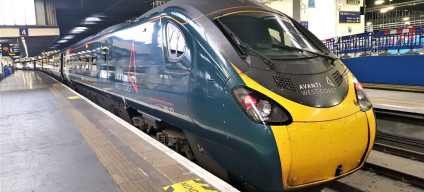
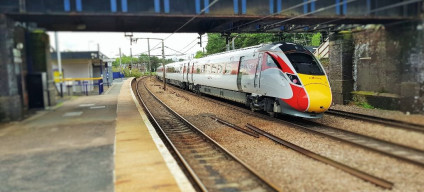
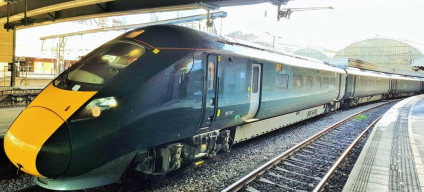
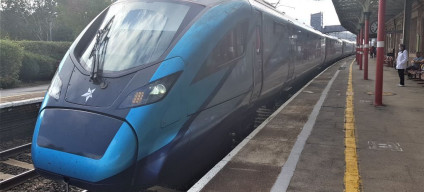
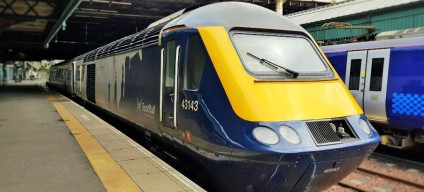
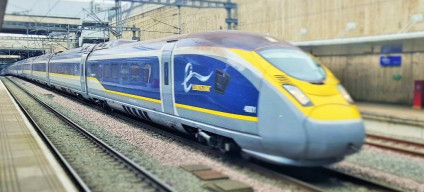
From and to London by train
The UK capital is served by more major stations than any other city in Europe, so there's a weight of useful info that's worth knowing about taking trains to and from London.
Hence the guide below:
- includes links to detailed info on how to use the eight largest London stations
- useful info on how to use / avoid the Underground and how to use the other cross-city railways
- how to transfer between the major stations
- explains how to travel on to the tourist destinations from each major station
- how to use the trains to travel between London's airports and the city centre.
The journey guides include access to booking links and information about the trains, tickets and destination stations. Plus for the scenic routes there are insights on how to make the most of the rides on the trains.
Search for a journey:
Journeys from Edinburgh, Glasgow and Manchester
Notes on the stations
The nine things most worth knowing about taking a train from a UK station are:
1: Unlike countries such as France, Italy or Germany there can be differences in how the information at UK stations is provided to travellers.
Twenty of the largest stations are managed by Network Rail but all other stations are most typically managed by the Train Operating Company, which happens to provide most of the train services at that station.
Therefore there isn't a national standard for departure screens and signage etc - hence the info below has to be general summary.
2: Outside of London most cities only have one major station; the main exceptions are Birmingham and Glasgow and Manchester.
3: Until recently British stations didn't have any information which informed travellers of where to wait on a platform (track) for easy boarding into coaches in which reserved seats are located.
The platforms/tracks at British stations still aren’t usually divided into zones, as obviously as they are in France and Germany.
Instead the platforms (tracks) at many large stations, at which trains call at during a journey, now have comparatively small signs spaced along the platform, which show the coach numbers of the trains; usually the trains heading to and from London.
4: It's a good idea to pay close attention to the information screens on the platforms (tracks) as many of them now show a lot more information than the destination and time of the next departure - they often now also tell travellers where to wait on the platform if you have a reservation.
5: At the lager terminal stations, the platform / track number that a train will be leaving from, isn't usually confirmed until around 20 mins prior to departure.
6: If a train is departing on time it can be removed from the main departure board two minutes before it is due to leave.
7: On long distance trains heading away from London, the First Class coaches are usually at the rear of the train, when heading to London, they’re usually at the front.
8: Trains very rarely reverse directions at stations in Britain during their journeys, so if you prefer to face forwards, you will usually be facing that way for the entire trip.
The three major exceptions are:
-
Manchester <> Bristol/Exeter trains reverse direction at Birmingham,
-
Newcastle <> Southampton services reverse direction in both Birmingham and Reading,
-
Manchester <> Bournemouth services reverse direction at Reading.
9: The access to/from the trains at the major stations is by passing through ticket gates, so have your tickets to hand
Finding Your train
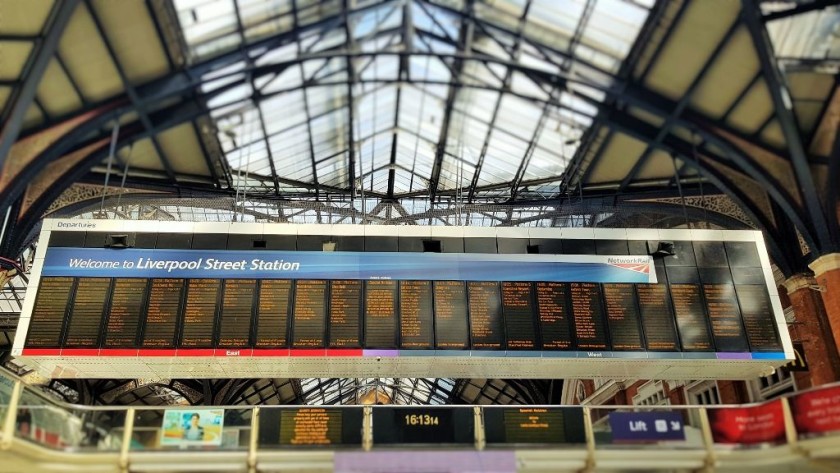
A train numbering system in which every individual train is given a specific code isn't used in Great Britain, so there isn't, for example, a train 5743 to Edinburgh which is also calling in York. Therefore in Britain the departure time is the key piece of information, which specifies the train you will be travelling by.
So if you will be travelling to York with a seat reservation on the 11:30 train from London Kings Cross, the key piece of information on your reservation is the departure time.
When you're at King's Cross station you can look for which train you will be boarding on the main departure board.
You would be looking for the train leaving at 11:30, it's final destination will be Edinburgh, but beneath its destination, all of the other stations the train will be calling, at will be listed.
One of these other stations will be York, so this 11:30 train to Edinburgh, is also the train to York.
Therefore the train departures are arranged in vertical columns of lists of the stations that each departure will be calling at.
As each train departs, the columns shift to the left, because they are shown in departure order from left to right.
Top right on each column will be the platform (track) number, but when each departure is initially listed, it will often be blanked out.
So you'll know which departure you will be taking because you'll have matched your destination to the departure time, but you won't know, yet, which platform it will be leaving from.
You need to keep an eye on the departure board, because at some point the platform number will appear and it won't usually be announced; only untypical information is usually announced at stations.
On the platform
On the platforms at non-terminus stations, the departure info will also list all of the stations that the next train to depart will be calling at.
Though this info can be shown as scrolling text; this text is worth watching closely as it can also covey additional info other than the calling points.
Taking time out to check all of the info on the platform departure screens is recommended, particularly when travelling long-distance.
As explained above, you can often use the info to work out where to wait for boarding into the coaches in which your reserved seats will be located, but other useful info, not usually shown on the main departure boards, can include the scheduled arrival time at each calling point.
Detailed station guides
Click the buttons below to discover how to travel to and from the stations by public transport, plus links to additional info including the station and city websites.
11 Most Scenic Journeys
The scenic sections of the journey are shown by the arrows:
- Glasgow - Dalmuir > Arrochar > Fort William > Mallaig
- Leeds - Skipton > Settle > Carlisle
- Exeter > Totness - Plymouth > Lostwithel (Cornwall)
- Inverness > Kyle of Lochalsh
- Machynlleth > Pwllheli
- Newcastle - Morpeth > Berwick upon Tweed > Dunbar - Edinburgh > Kirkcaldy > Dundee > Stonehaven > Aberdeen
- Lancaster > Carlisle > Carstairs - Glasgow and Edinburgh
- Edinburgh > Kirkcaldy > Perth > Inverness
- St Erth > St Ives
- Swansea > Llanelli > Llandrindod > Craven Arms - Shrewsbury
- Sheffield > Stockport
Short videos showcasing some of these journeys have been uploaded to the ShowMeTheJourney channels on YouTube dedicated to England and to Scotland.

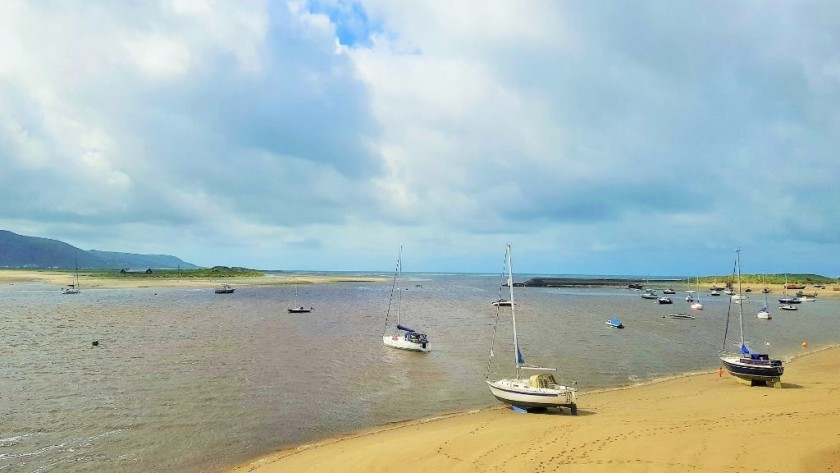
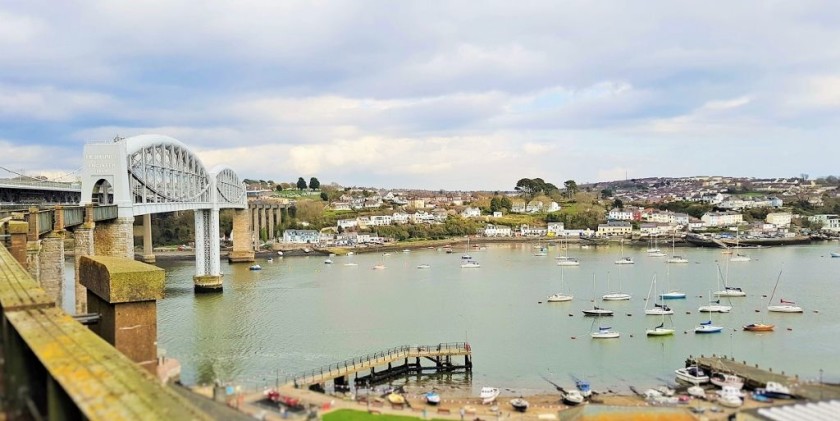
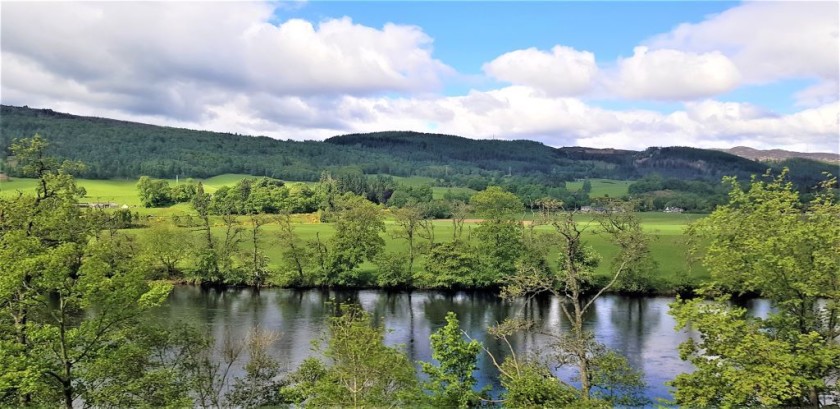
Two For One Visitor Attractions when using rail tickets:
National Rail, which has overall responsibility for how the trains are managed in Britain, has teamed up with a swathe of tourist attractions for a promotion which allows two entry tickets for the price of one when travelling to and from them by train.
How it typically works is:
- You can look for which attractions and guided tours are members of the scheme on the National Rail website.
- Having chosen an attraction you can then see how to book the special promotional tickets or voucher; when needed you can find promo codes on the dedicated page for each attraction on the National Rail Website.
- On the online booking page of the attraction you should see an option which corresponds to 'National Rail - Two for One offer'.
- Book your attraction tickets or voucher.
- On arrival at the attraction you present your attraction tickets and rail tickets to gain entry.
The offers are available to visitors to the UK as well as residents, so they can be a great way to save money when on a holiday.
Though what's good to know is:
- You need to present either the outward or return part of a national rail ticket to gain entry, along with your attraction tickets, so Oyster Cards and other Travelcards aren't valid.
- The ticket machines at stations will retain one-way tickets, hence return tickets are a must - and if possible avoid putting your outward tickets through the machine, by asking the staff to open the gates/barriers.
- The two people entering the attraction on the 2-for-1 offer will both need separate rail tickets.
- The type of rail ticket, how much you paid for it and the distance travelled all don't matter, any pair of return rail tickets will suffice.
- If you have one, you can use Railcards to book the rail tickets.
Explore stunning Scotland by train
Be inspired and discover how to make the fabulous journeys
Explore beautiful Wales by train
How to experience the coasts and mountains without a car
Holidays by train:
Make going by rail the star attraction of your explorations.
Going continental by rail:
Escape from Britain on the train:
Visiting Britain and exploring by train
If you are not resident in the UK you can use Eurail and Interrail 'global' passes to see Britain by train in addition to other countries of your choice; though you'll need to be sure that your trip to and from England / Scotland / Wales falls within your selected period of time that your pass will be valid for.
For European citizens Interrail for Great Britain passes are available for 3, 4, 5, 6 or 8 days of non-consecutive travel.
Everybody else who solely wishes to explore Britain by train can make use of BritRail passes; and if you meet the Interrail criteria and aren't resident in the UK, there are BritRail passes valid for two days of travel which are cheaper than those Interrail passes valid for 3 days.
Eurail passes are not available solely for travel in Great Britain.
With any of these passes you can hop on any daytime national rail service, reservations are available but optional on most long-distance routes; and on daytime trains there will be no charge for making the reservation; special rates are available to rail pass users on the Caledonian Sleeper and Night Riviera services.
Users of Eurail and Interrail 'global' passes can book reservations on Eurostar, which can seem pricey, but the cost per day of using the pass + the reservation fee, is often much cheaper than booking Eurostar tickets.
However, BritRail passes are not valid on the Eurostar.
This second version of ShowMeTheJourney is exciting and new, so we are genuinely thrilled that you are here and reading this, but we also need your help.
We’re striving not to let anything get in the way of providing the most useful service possible, hence a facility has been set up with DonorBox which can be used to support the running costs and make improvements.
Instead of advertising or paywalls, your financial support will make a positive difference to delivering an enhanced service, as there’s a lot of ideas which we want to make happen.
So if you have found the info provided here to be useful, please consider saying thank you.
See if there’s a unique journey guide for your trip, featuring info on the trains, tickets & stations.

This is one of more than 100 train travel guides available on ShowMeTheJourney, which will make it easier to take the train journeys you want or need to make. As always, all images were captured on trips taken by ShowMeTheJourney.








